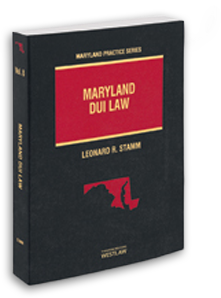(Vol. 8, Maryland Practice Series)
By: Leonard R. Stamm
New Maryland Drunk Driving Laws – Effective October 1, 2001
Effect of a Breath or Blood Test in Maryland state court
In Maryland, the approved breath testing device is currently the Intoximeter EC/IR. It is intended to give a measurement of deep lung air in grams of alcohol (a weight) per 210 liters of breath (a volume). For blood tests the result is measured in grams of alcohol per 100 milliliters of blood.
The test results have legal significance. If the result is .08 or more the driver is per se under the influence.
If the test result is .07 or more, but less than .08, it is considered prima facie evidence the driver is impaired by alcohol.
If the test result is more than .05 but less than .07, the test evidence is considered neutral.
If the test result is .05 or less, the driver is presumed not to be under the influence of alcohol.
For the driver who is under 21 years of age, the legal limit is .02. The driver may lose their driver’s license or privilege for 6 months and be fined. It is important to consult with a lawyer to gain a further understanding of the ramifications of these tests.
A refusal to submit to a test may be considered as evidence of the driver’s guilt.
Drunk driving laws contain possible enhanced penalties for repeat offenders. A person who is convicted a second time of driving under the influence in violation of § 21-902(a) within 5 years of a prior “a” conviction receives a mandatory one year suspension of their driver’s license or privileges. There is no work permit or interlock restriction allowed for the one year. After the year the person is required to put an interlock on all vehicles they own for from 3 months to one year. They are entitled to a hearing for an Adminstrative Law Judge to determine the length of the interlock restriction and whether there is financial hardship involved with installing an interlock on more than one car.
Additionally, a second “a” conviction within 5 years of the first carries a mandatory minimum sentence of 5 days incarceration or 30 days community service. A third “a” conviction within 5 years carries a mandatory minimum sentence of 10 days incarceration or 60 days community service. Incarceration includes house arrest or in patient treatment.
A person with a test result of .15 or more is not eligible for a work permit. Instead the applicable license or privilege suspension periods are 90 days for a first offense and 180 days for a subsequent offense. If the person needs to drive they may only continue to drive if the Administrative Law Judge grants an interlock for a minimum of one year. This option is also available if the person installs an interlock, gives up the hearing, and signs up for the ignition interlock program within 30 days of arrest.
A person with a second administrative offense of failing or refusing a chemical test within 5 years of a prior failure or refusal is also ineligible for a work permit, but may request an ignition interlock to continue driving.












